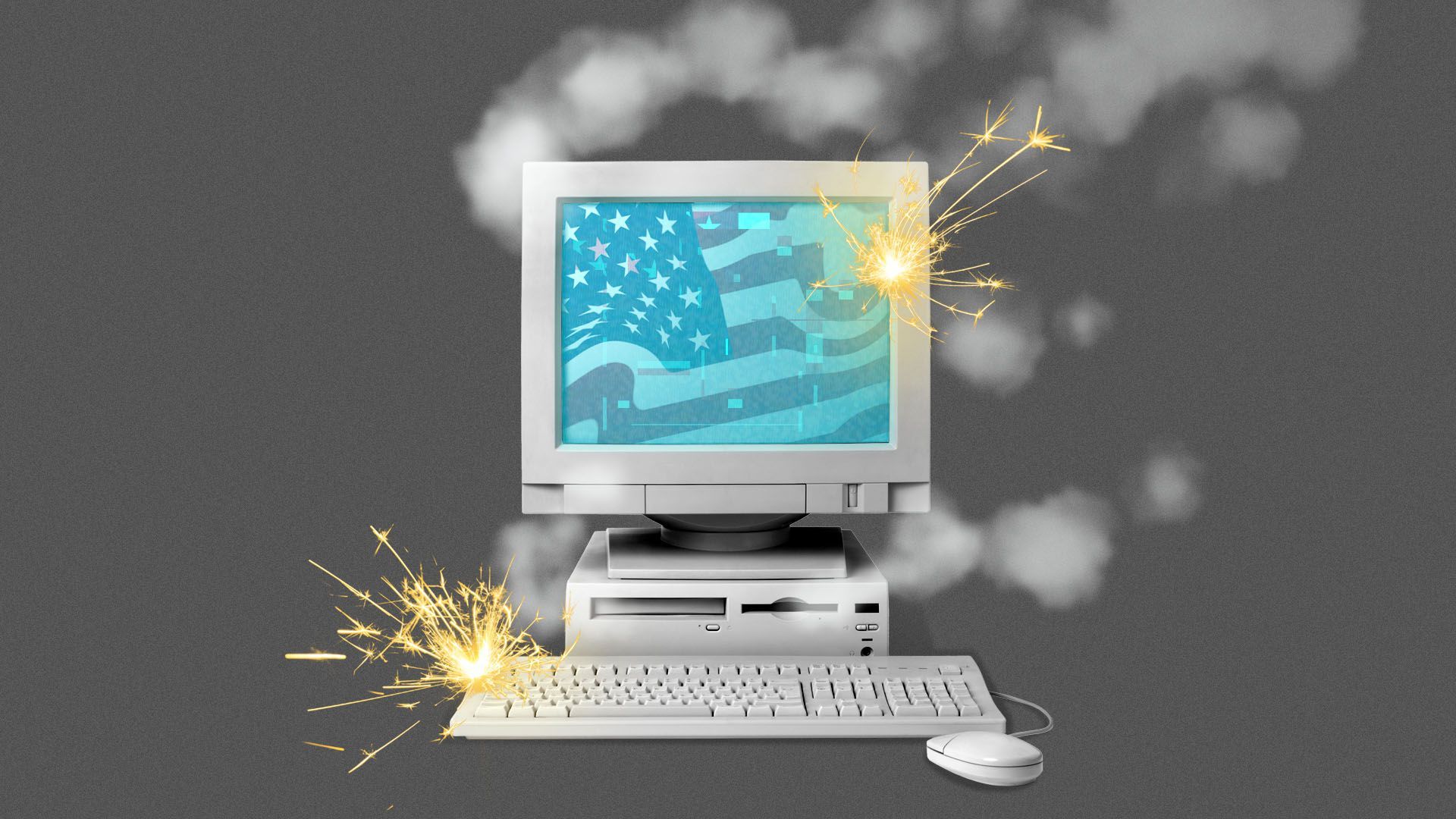Tech platforms' last-minute election rule changes raise risks
Add Axios as your preferred source to
see more of our stories on Google.

Illustration: Sarah Grillo/Axios
Election-related policy changes introduced by tech companies at the last minute will put their efforts to control misinformation in the spotlight over the next few days as the U.S. readies for election results.
Why it matters: Most of the new policies haven't been tested in real time yet, and the platforms have a record of confusion, inconsistency and self-reversal as their rules land on the information battlefield.
What's new: Facebook and Twitter elaborated on Monday their plans to rely on selected news outlets to call races, which will the govern how they apply labels to posts that prematurely claim victory.
- Twitter said it's relying on calls from ABC News, AP, CNN, CBS News, Decision Desk HQ, Fox News and NBC News to determine winners.
- Facebook said Monday it would be relying on consensus results from the National Election Pool/Edison via Reuters, the Associated Press, NBC, ABC, CBS and Fox.
- Last week YouTube announced that it will add to all election-related search results and videos about the election an information panel noting that "election results may not be final" and linking to Google’s election counts.
- Verizon Media told clients last week it would be imposing a political ad ban from Wednesday to Sunday, the Wall Street Journal reported.
Be smart: Tech companies have a record of rolling out new policies, sometimes right before major events, that go awry in their implementation.
- Facebook said last week that a mix of "technical problems" and confusion among advertisers around its new political ad ban rules held some ads back that should have been displayed, causing uproar from Democrats and Republicans.
- Twitter did an about-face on its hacked materials policy after the New York Post published a controversial article about materials allegedly found on Hunter Biden's laptop, first limiting the spread of the article, including locking the Post out of its Twitter account, then backtracking completely.
- Earlier this year, when Facebook faced criticism for failing to take down a Wisconsin militia page that may have been connected to an incident of violence against protesters, CEO Mark Zuckerberg said it had made an "operational mistake." The policy governing militia groups' postings had only been put in place a week before.
Yes, but: Social media giants have made real efforts to tackle election misinformation and security problems with more transparency over the past two years.
- YouTube has created a "decision desk" to monitor Internet trends around the world and in April, rolled out fact checks on YouTube.
- Google, its parent company, said it would ban all election-related advertising after polls close on Tuesday, a move Facebook has also committed to, in addition to a pre-election ban of any new political ads. Google will also work with AP to surface authoritative election results in search.
- Twitter will flag tweets that claim an election win before it's authoritatively called. It's made significant changes to the way news can be shared on its platform ahead of the election, in an effort to slow misinformation from spreading. It's adding many more labels to tweets that may attempt to meddle in the voting process.
- Facebook has created a voter information center continuing verified election-related information. It will be using notifications in users's feeds to guide them to accurate results on Election Day. It also turned off recommendations for political and social groups.
Snapchat has the strictest rules around election-related content. The tech giant faces much less scrutiny for misinformation on its platform, although it is much smaller than Facebook and Google and serves a different function.
- A member of Snapchat's editorial team will be actively checking all published content from the company's Discover partners during the election results period to make sure it meets standards. Snapchat says it has ramped up its internal moderation plan by allocating extra resources to moderate content.
- Unlike its peers, Snapchat says it will take down any premature election calls that haven't been verified, as well as any election-related misinformation, instead of just minimizing its distribution.
The big picture: Big tech is sure to be under scrutiny no matter how well it enforces its own policies today. Misinformation will slip through; candidates, journalists and voters will have their content flagged and be confused about it; and the platforms will be blamed for whatever mess transpires on the internet.
- The difference between now and 2016: Tech firms are well-aware of these potential calamities and is trying to prevent them.

